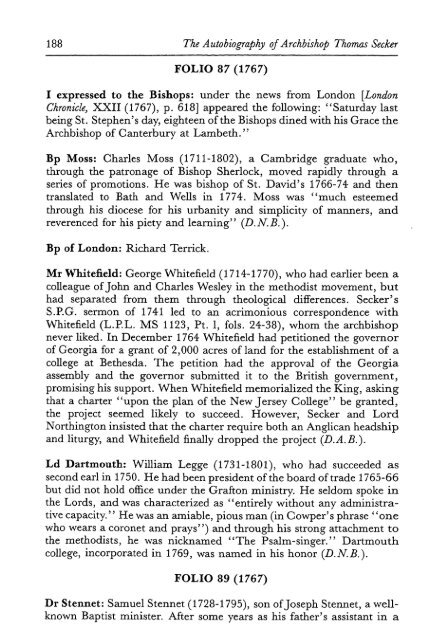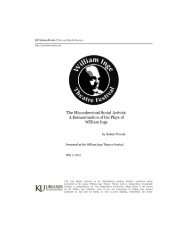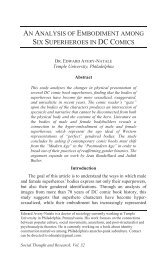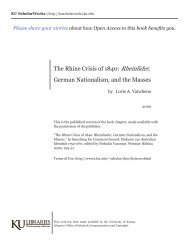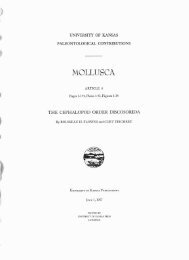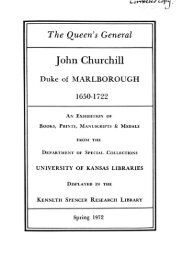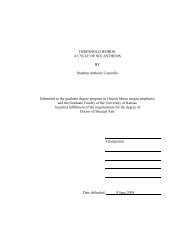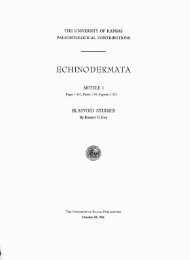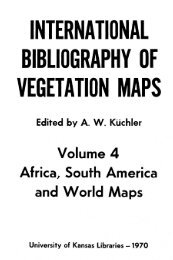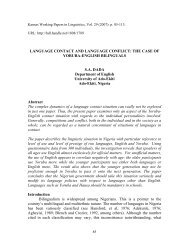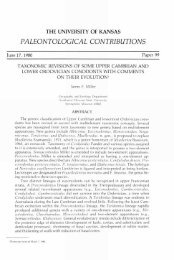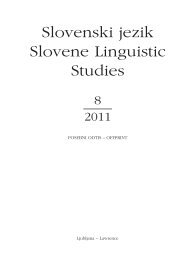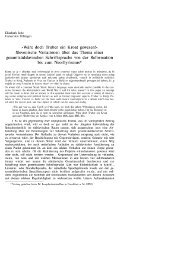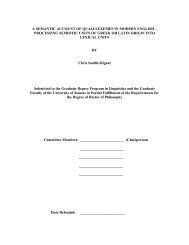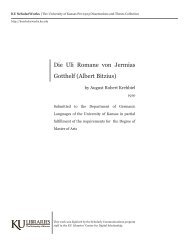Archbishop of Canterbury - KU ScholarWorks - The University of ...
Archbishop of Canterbury - KU ScholarWorks - The University of ...
Archbishop of Canterbury - KU ScholarWorks - The University of ...
Create successful ePaper yourself
Turn your PDF publications into a flip-book with our unique Google optimized e-Paper software.
188<br />
<strong>The</strong> Autobiography <strong>of</strong> <strong>Archbishop</strong> Thomas Seeker<br />
FOLIO 87 (1767)<br />
I expressed to the Bishops: under the news from London [London<br />
Chronicle, XXII (1767), p. 618] appeared the following: "Saturday last<br />
being St. Stephen's day, eighteen <strong>of</strong> the Bishops dined with his Grace the<br />
<strong>Archbishop</strong> <strong>of</strong> <strong>Canterbury</strong> at Lambeth."<br />
Bp Moss: Charles Moss (1711-1802), a Cambridge graduate who,<br />
through the patronage <strong>of</strong> Bishop Sherlock, moved rapidly through a<br />
series <strong>of</strong> promotions. He was bishop <strong>of</strong> St. David's 1766-74 and then<br />
translated to Bath and Wells in 1774. Moss was "much esteemed<br />
through his diocese for his urbanity and simplicity <strong>of</strong> manners, and<br />
reverenced for his piety and learning" (D.N.B.).<br />
Bp <strong>of</strong> London: Richard Terrick.<br />
Mr Whitefield: George Whitefield (1714-1770), who had earlier been a<br />
colleague <strong>of</strong> John and Charles Wesley in the methodist movement, but<br />
had separated from them through theological differences. Seeker's<br />
S.RG. sermon <strong>of</strong> 1741 led to an acrimonious correspondence with<br />
Whitefield (L.P.L. MS 1123, Pt. 1, fols. 24-38), whom the archbishop<br />
never liked. In December 1764 Whitefield had petitioned the governor<br />
<strong>of</strong> Georgia for a grant <strong>of</strong> 2,000 acres <strong>of</strong> land for the establishment <strong>of</strong> a<br />
college at Bethesda. <strong>The</strong> petition had the approval <strong>of</strong> the Georgia<br />
assembly and the governor submitted it to the British government,<br />
promising his support. When Whitefield memorialized the King, asking<br />
that a charter "upon the plan <strong>of</strong> the New Jersey College" be granted,<br />
the project seemed likely to succeed. However, Seeker and Lord<br />
Northington insisted that the charter require both an Anglican headship<br />
and liturgy, and Whitefield finally dropped the project (D.A.B.).<br />
Ld Dartmouth: William Legge (1731-1801), who had succeeded as<br />
second earl in 1750. He had been president <strong>of</strong> the board <strong>of</strong> trade 1765-66<br />
but did not hold <strong>of</strong>fice under the Grafton ministry. He seldom spoke in<br />
the Lords, and was characterized as "entirely without any administrative<br />
capacity." He was an amiable, pious man (in Cowper's phrase "one<br />
who wears a coronet and prays") and through his strong attachment to<br />
the methodists, he was nicknamed "<strong>The</strong> Psalm-singer." Dartmouth<br />
college, incorporated in 1769, was named in his honor (D.N.B.).<br />
FOLIO 89 (1767)<br />
Dr Stennet: Samuel Stennet (1728-1795), son <strong>of</strong> Joseph Stennet, a wellknown<br />
Baptist minister. After some years as his father's assistant in a


